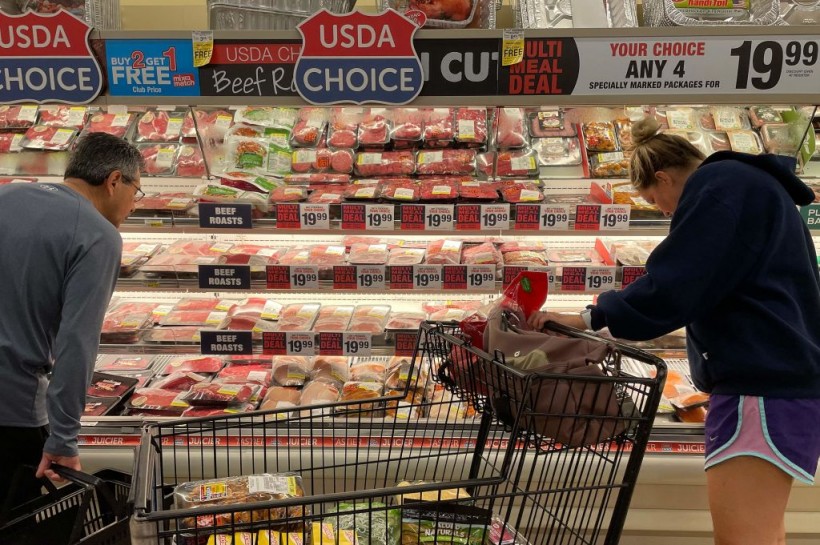Meat from the bison-cattle hybrid, known as 'beefalo,' had been slowly crawling into the food industry for some time. The choice of protein has been gaining much attention from both meat companies and the health-conscious public.
Beefalo vs. Conventional Meat

Consumers shop for meat at a Safeway grocery store in Annapolis, Maryland, on May 16, 2022, as Americans brace for summer sticker shock as inflation continues to grow.
Bison contains one of the very best lean meat produced for the market. However, their population dropped, leading to the rarity of this healthier choice of protein cut. The animals are also considered wild and are challenging to tend in captivity.
Cattle, on the other hand, are much more farm-friendly. People's appetites find cattle meat more delicious and healthier than other proteins. But in reality, cattle cuts contain staggering amounts of fat, antibiotics, steroids, and other compounds used to prevent them from diseases and maintain their quality before production.
A third option might be the best meat option of the future. These cuts are from beefalo, a combination of all the best things from the bison and cattle animals.
The US agriculture department recently certified 'beefalo' as an option with higher protein and vitamin levels than conventional meats.
The beefalo has 79 percent less fat, 66 fewer calories, and one-third less cholesterol than the usual beef we consume.
Agriculture authorities are trying to build up the reputation of beefalo as a healthy and safe alternative to the common meats we have at stores and in groceries. They also established several guidelines for nurturing and care processes for beefalo farming.
According to the American Beefalo Association, raising beefalo is more sustainable than raising cattle. For example, These hybrids could be managed through planned grazing, which closely mimics the natural herd migration of cows and other meat choices. Farming beefalo also costs less than what people spend on raising conventional cows.
ALSO READ: Bovine Tuberculosis Explained: Mycobacterium Bovis Bacteria Infects Beef Herd, Can It Affect Humans?
Advantages of Raising Beefalo
Beefalos could consume little to no grain feed, unlike cows that require numerous formulas to sustain their health before slaughter. The animals could also endure extreme weather conditions and various seasons.
The food preference of beefalos is leaning more toward buffalo than bovine, but most of its traits were honed from cattle rather than bison.
Alongside being affordable to raise and requiring less human-grown agriculture, it is ensured that the beefalos produce a type of meat that is hormone-free, grass-fed, organic, and all-natural. They could also benefit the farmlands by giving fertile soil when taken care of perfectly.
Savory Institute, one of the leading livestock firms, developed a holistic approach to pasture animals. The company aims to simulate nature in a more realistic way to cater to the needs of products.
For the last decade, the institute has already reintegrated nearly 16 million hectares of farmlands through its holistic management across various countries. Most of the spaces they modified would work with the low-maintenance state of beefalos.
Beefalo are being raised on many farms across the southern Midwest, including Arkansas, Oklahoma, Missouri, Texas, and Kansas, The Manual reports.
RELATED ARTICLE: Moon Gardening: Experiments of Growing Plants on 'Lunar Regolith' Yield Promising Results
Check out more news and information on Agriculture in Science Times.




![Earth's Quasi-Moon Kamo‘oalewa Could Originate From Lunar Surface Not Asteroid Belt [Study]](https://1721181113.rsc.cdn77.org/data/thumbs/full/53275/89/56/50/40/earths-quasi-moon-kamo-oalewa-could-originate-from-lunar-surface-not-asteroid-belt-study.png)









